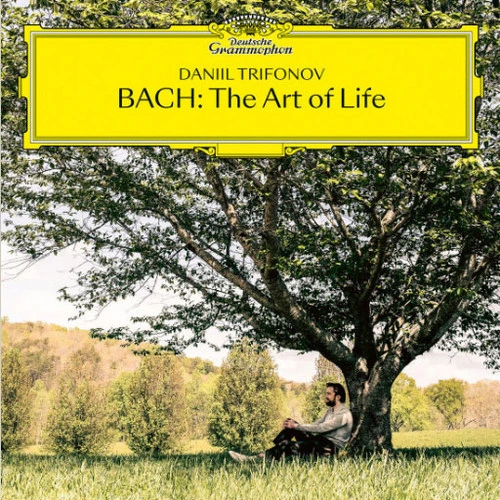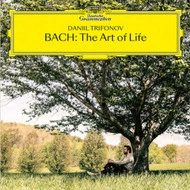Trifonov Explores The Spiritual Dimensions Of Bach's Work On 180g Vinyl 3LP!
Daniil Trifonov presents his new Deutsche Grammophon solo recording, Bach - The Art of Life. Centered around Johann Sebastian Bach's late masterpiece The Art of Fugue, the new album reflects Trifonov's insight into the family life and music-making of one of the greatest composers of all time. Works by four of Johann Sebastian's sons, as well as two pieces known to have been Bach family favorites are also included in a program taking in everything from lighthearted dance-like pieces to the mournful majesty of the Chaconne in D minor. Already renowned for his recordings of the Romantic repertoire, Daniil Trifonov brings the same magical combination of vitality, sensitivity and flawless technical command to these works of an earlier age.
The album begins in a lighter vein with a family portrait in the shape of four charming works by his gifted sons: Johann Christian's Sonata No. 5 in A major, Wilhelm Friedemann's Polonaise No. 8 in E minor, Carl Philipp Emanuel's Rondo in C minor and Johann Christoph Friedrich's Variations on "Ah, vous dirai-je, maman". Trifonov notes that it was common in Germany at that time for families to have their own specialization and Bach, himself descended from musicians, clearly passed on his gifts: "It's an incredible parental achievement that four of his children wrote wonderful music! And each had his own individual voice."
Trifonov also presents a selection of music from the notebook Johann Sebastian gave his second wife Anna Magdalena in 1725, which features works by family members and others. As well as pieces by Bach himself, perhaps used when he was teaching his children, Trifonov has chosen a Minuet by Christian Petzold and a love song: Gottfried Heinrich Stölzel's aria "Bist du bei mir". As he points out, "Bach is known as one of the greatest composers of religious music...but he was also an ordinary human, he fell in love, he was a family man..."
Forming a contrast to these short album pieces is Trifonov's performance of Brahms's transcription (for the left hand) of the Chaconne in D minor, originally scored for solo violin and thought by some to be Bach's response to the death of his first wife, Maria Barbara. "What I love about Brahms's transcription," says the pianist, "is that it's so close to understanding how the violin works...it conveys the struggle of the violinist who has to reach for intervals with the left hand." Trifonov brings out the music's blend of Baroque and Romantic sensibilities, investing its architecture with a dark, meditative quality.
He shows the equally impeccable technique in The Art of Fugue, which consists of fourteen fugues and four canons that explore, on a mathematical basis, the contrapuntal possibilities inherent in a single theme. This monumental work is rarely heard in performance, partly because of its technical demands and partly, as Trifonov explains, "because it is all written in one key and on one theme so the performer has to bring enough variety to the score."
The pianist is intrigued by Bach's attempts to base the work on the Fibonacci sequence and the golden ratio, but observes that the result is "far more than a scientific experiment: as always with Bach, he managed to make music of indescribable beauty and emotion." Trifonov's imaginative interpretation captures the sense of the work as a cycle, treating it as a living, organic whole. This chimes with the inspiration he takes from spending time in nature, whether hiking or practicing Qigong, a form of meditation that values the healing energy of trees. "And the tree is a good metaphor for The Art of Fugue's overall structure," he notes. "The theme is the trunk, the fugues are the branches, all the permutations within each fugue are the leaves..."
Bach did not live to finish The Art of Fugue's final contrapunctus, and a number of musicians have attempted conjectural completions. For this recording, Trifonov, himself an accomplished composer, has created a seamless, stylistically respectful conclusion worthy of Bach's genius. It reflects the extent to which he has absorbed and internalized every nook and cranny of Bach's valedictory masterpiece.
He ends his program with an eloquent reading of Dame Myra Hess's transcription of "Jesu, Joy of Man's Desiring", a reminder that, for Bach and his contemporaries, "music was another embodiment of nature and natural laws, and mathematics and science were also thought to be part of a divine order."
Features
- 180g Vinyl
- 3LP
- Gatefold jacket
- Made in Germany
Musicians
| Daniil Trifonov | piano |
|---|




 Turntable Accessories
Turntable Accessories Headphone Accessories
Headphone Accessories Cable Accessories
Cable Accessories Vinyl Accessories
Vinyl Accessories Compact Disc Accessories
Compact Disc Accessories







